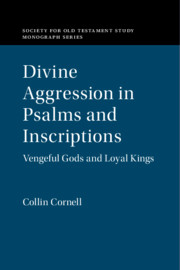Refine search
Actions for selected content:
2 results

Divine Aggression in Psalms and Inscriptions
- Vengeful Gods and Loyal Kings
-
- Published online:
- 16 October 2020
- Print publication:
- 15 October 2020
6 - Conclusions and Implications
-
- Book:
- Divine Aggression in Psalms and Inscriptions
- Published online:
- 16 October 2020
- Print publication:
- 15 October 2020, pp 200-214
-
- Chapter
- Export citation
